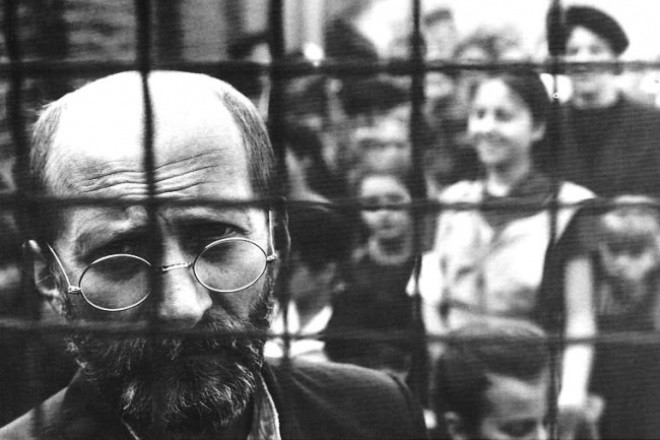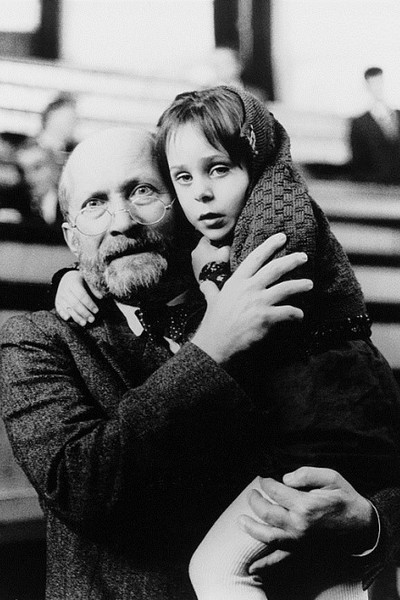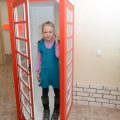When I was ten, I burst into tears,reading "King Mathius First". Then for me it was just a sad book. Several years later I cried when I heard about the fate of its author. Polish teacher, writer, doctor and public figure. The director of the orphanage founded by him for Jewish children, Janusz Korczak, placed first of all on the moral education of a person. In peacetime, he fought for the souls of his pupils. When the Second World War began, the struggle was already going on for their lives. In 1940, despite all the efforts of the teacher, the children from the Orphans' Home found themselves in the Warsaw ghetto. Jews are second-class people for the Hitlerites. Korczak spent a month in prison and went out with a shattered health, but not broken. Photo: cont.On August 6, 1942, 192 children from his orphanage were sent to the camp of the death of Treblinka. With them were two teachers - Korczak himself and his assistant Stefania Vilchinskaya. According to eyewitnesses, at the last moment one of the German officers handed Korczak a paper. The Germans were ready to give life to a famous teacher. But only to him alone. Without children. Janusz refused. And after a while he was killed along with his pupils in the gas chamber Treblinka. After himself, Janusz Korczak left an amazing pedagogical heritage. As early as 1934, he formulated five main commandments for his parents in the kibbutz. Loving the child in general, not just his own. Observe the child. Do not put pressure on the child. Be honest with yourself, to be honest with the child. Know yourself not to take advantage of a defenseless child. Years later, Betty John Lifton's biographer, in the book The King of Children, dedicated to Korczak, recalls: Janusz Korczak spoke of the need to create a declaration of children's rights long before such documents were developed at the UN. "Reading the Children's Right to Respect," "How love the child "and other works, I gathered together those rights that Korczak considered the most important," - wrote Lifton. Some of these theses, perhaps, is now surprising. Something - the desire to argue. But everyone will read something in them. And, perhaps, will accept - as a guide to action.
Photo: cont.On August 6, 1942, 192 children from his orphanage were sent to the camp of the death of Treblinka. With them were two teachers - Korczak himself and his assistant Stefania Vilchinskaya. According to eyewitnesses, at the last moment one of the German officers handed Korczak a paper. The Germans were ready to give life to a famous teacher. But only to him alone. Without children. Janusz refused. And after a while he was killed along with his pupils in the gas chamber Treblinka. After himself, Janusz Korczak left an amazing pedagogical heritage. As early as 1934, he formulated five main commandments for his parents in the kibbutz. Loving the child in general, not just his own. Observe the child. Do not put pressure on the child. Be honest with yourself, to be honest with the child. Know yourself not to take advantage of a defenseless child. Years later, Betty John Lifton's biographer, in the book The King of Children, dedicated to Korczak, recalls: Janusz Korczak spoke of the need to create a declaration of children's rights long before such documents were developed at the UN. "Reading the Children's Right to Respect," "How love the child "and other works, I gathered together those rights that Korczak considered the most important," - wrote Lifton. Some of these theses, perhaps, is now surprising. Something - the desire to argue. But everyone will read something in them. And, perhaps, will accept - as a guide to action.
- The child has the right to love: "Love the child, not only your own"
- The child has the right to respect: "Let's demand respect for shining eyes, smooth foreheads, youthful energy and gullibility. Why do extinct eyes, wrinkles, untidy, gray hair or tired indifference cause more respect? "
- The child has the right to optimal conditions for growth and development: "We demand: down with hunger, dampness, stench, cramping, overcrowding."
- A child has the right to live in the present: "Children are not people of the future, they are people of today."
- A child has the right to be himself: "A child is not a lottery ticket, from which the prize of the main prize is expected."
 Photo: fit4brain.com
Photo: fit4brain.com
- The child has the right to make mistakes: "There are no more fools among children than adults".
- The child has the right to failure: "We reject the deceptive desire to make the child perfect."
- The child has the right to be taken seriously: "Who is asking the opinion of the child or his consent?"
- The child has the right to be appreciated for what he is: "A child, being small, has a low market price."
- The child has the right to desire, make demands, ask: "Every year the gap between the needs of adults and the desires of children is rapidly expanding."
- The child has the right to secrets: "Respect their secrets".
- In some cases, the child has the right to lie, cheat, steal: "The child has the right to lie, to lure, force, steal. A child has no right to lie, to lure, to force, to steal. "
- The child has the right to respect his property, his budget: "Everyone has the right to property, however small or of little value it may be."
- The child has the right to education.
- A child has the right to resistpedagogical influence if it contradicts his own convictions: "Humanity is fortunate that we have no way to force children to give in to our attacks on their common sense and philanthropy."
- The child has the right to protest against injustice: "We must put an end to despotism."
- A child has the right to a child's court, where he canto judge the peers and judge them: "Now we are the only judges of the child's actions, thoughts and plans ... I know how important the Children's Court is, and I am sure that in 50 years there will not be a single school or organization without such a court."
- The child has the right to protection within the judicialsystem for juvenile offenders: "The child who has broken the law remains a child ... Unfortunately, poverty, spreading like an epidemic, nourishes sadism, crime, rudeness, cruelty."
- The child has the right to respect his sorrows: "Even if it's just a loss of a beautiful pebble."
- The child has the right to communicate with God. The child has the right to premature death: "The deep love of the mother for her child should give him the right to premature death, so that his life lasts one or two springs ... Not every bush grows into a tree."









